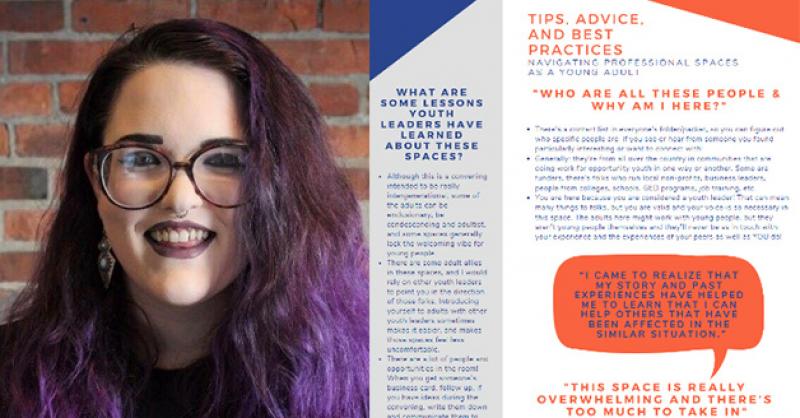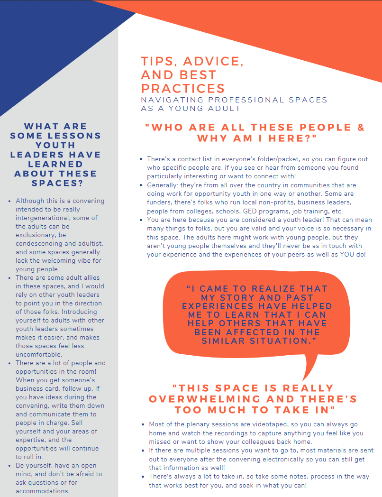Creating Resources to Empower Rising Leaders

“I wanted to create a resource for rising leaders who feel the same mix of nervousness and uncertainty I felt when I first entered this space.”
Amanda serves as Coordinator of the Youth Voice Project. She began with Youth Voice Project in April 2015 and quickly grew to become an advocate for out-of-school youth. She plans and hosts events for youth and partners with other youth-serving organizations across Boston. Amanda has significant experience advocating for youth. She is: an Alumni Coordinator at the Boston Day and Evening Academy; a co-lead of the Opportunity Youth United Boston Community Action Team; a recent Youth Facilitator & Content Consultant with the Rennie Center for Education Research & Policy; and a Youth Fellow for the Youth Transition Funders Group’s Economic Well-Being Working Group. Below, she shares how she came to develop a guide for young people who are active in adult-led spaces.
The first professional conference I ever attended was a totally new experience for me. I was 21 and I had never traveled without my family or friends. I had never been anywhere like Aspen, Colorado, where the conference was held, and I had never presented anything about my work outside of my own community.
I was proud of the work we were doing in Boston with the Boston Private Industry Council (PIC), the Dudley Street Neighborhood Initiative, and Teen Empowerment. And yet, I felt anxious about being in a conference space with so many people, especially because very few of them were around my own age. It seemed like everyone else already knew each other. The conference agenda looked like a college class schedule and I felt overwhelmed. I wasn’t sure who to turn to with questions.
What turned the whole conference around for me was being welcomed warmly by people who recognized me and told me they were excited to meet me. Some people introduced me to others and created space for me. I could ask my questions, attend sessions with familiar faces, and didn’t have to sit alone at breakfast the next morning.
Now, years later, I feel like I am on the other side of things. I look forward to conferences, I know what to expect, I know which friends I’ll be fortunate enough to see, and which adult allies. Still, every time I go to a conference, I see someone who has the same look in their eyes that I must have had at my first conference—the scared and nervous feeling you try to hide so you can perform as your best “work-self,” but often can’t disguise on your face.
That’s why I wanted to create a resource for rising leaders who feel the same mix of nervousness and uncertainty I felt when I first entered this space. I developed a “survival guide” to answer their questions and make them feel more comfortable entering professional spaces.
To create the guide, I drew from my own personal experiences and asked others on the Aspen Opportunity Youth Fund planning team for their words of wisdom, questions, and examples of how they themselves have maneuvered through these professional spaces.
I gathered different kinds of advice related to networking and making the most of professional spaces. Everything on this one-pager is not simply for young people, it’s created by young people.
Here are some of the lessons I’ve learned, so far.
Saying Yes
In the guide, I chose to focus a lot the idea of being open to new opportunities, because saying “yes” to things I wasn’t totally sure about has helped me a lot. For example, at my first convening, the facilitators asked me at the last minute to share some reflections on the  big stage, in front of everyone, to close out the convening. I said yes before I could worry too much.
big stage, in front of everyone, to close out the convening. I said yes before I could worry too much.
That has a lesson I’ve learned again and again: As much as having boundaries and being able to say no is crucial—especially as an Opportunity Youth navigating professional spaces—saying yes to anything that I want to throw myself into has allowed me to not only be invited into rooms I really want to be in, but to open the door myself.
Working Together
I follow up on the things that excite me, but I also rely on other youth leaders and folks from my community. For me, the best example is networking: talking to strangers isn’t something I enjoy doing, but some people are naturals at it. That is to say that we should all learn to lean on our peers, because we’re all in this together. As the saying goes: If one of us is eating, we’re all eating.
Networking
That brings me to one element that I don’t think I completely captured on the one-pager “survival guide” I created, but that has been really pivotal to the opportunities I’ve been fortunate enough to receive: learning how to “sell yourself.” Networking with people is important, both personally and professionally. It’s not always a great feeling, but if you know what your work is and you can externally relay how much it means to you, it will matter to others too. Whether in meetings, at convenings, or attending community events, I try to bring up what I’m working on, what is exciting to me about it and why I think it’s necessary.
Working Across Generations
Navigating professional spaces as a young leader will continue to be an ongoing conversation as more spaces welcome (or think they’re welcoming) young adults. It’s important for youth to understand that there’s no solution that will make people immediately look past your age when you’re young, and there’s no quick fix for making one’s expertise marketable. But I think the more we talk about these challenges and help each other wade through these waters, the closer we will get to those answers and solutions.
Similarly, it’s important for the older generations to reflect on the opportunities they were given, how they used those opportunities to get where they are, and to be forthcoming with sharing that.
I think the most important thing is that young adults never lose their confidence, or if they do, never lose the ability to fake some.
In fact, that’s my biggest piece of advice to other young leaders: act like you are it, because you are. For those we serve, and for ourselves, we have to demand opportunities, and we have to take up space, not just because we can, but because we deserve to.
